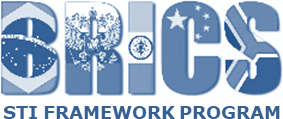Project “Monitoring and removal of antibiotics from wastewater by membrane separation”
The project leader of research group from Brazil – Prof. Dr. Salatiel Wohlmuth da Silva.
Prof. Dr. Salatiel Wohlmuth da Silva is a Doctor in materials engineering and industrial production. It`s department of the Federal University of Rio Grande do Sul / Institute of Hydraulic Research (UFRGS).
The Brazilian team from Federal University of Rio Grande do Sul and Feevale University has main knowledge in the application of electrochemical processes in the treatment of water and wastewater with or without products recovery. The group also works with the synthesis, characterization and application of supported catalysts and electrodes employed in advanced oxidation processes. In this sense, the previous experience will be beneficial to the development of the Electrochemical Advanced Oxidation (EAOP) aiming the removal of antibiotics, minimizing their discharge into the environment.
Project “Development of membrane-based methods to improve the recovery of pure water and valuable products from the waste”

The project leader of research group from Brazil – Prof. Andrea Moura Bernardes.
Prof. Andrea Bernardes is a Full Professor in Post-Graduation Program in Mining, Metallurgical and Materials Engineering (PPGE3M). It`s department of the Fedral Univeristy of Rio Grande do Sul (UFRGS).
The Brazilian research group will focus on the development of electrodialysis processes to improve the recovery of salts from different wastewater. Water desalination by electrodialysis has been applied in many countries. Water reclamation and reuse processes are also nowadays practiced in many countries around the world. Nevertheless, the current reuse represents only a small fraction of the total volume of municipal and industrial wastewater produced and the recovery of salts is still a matter of research. Electrodialysis processes will be applied to the recovery of salts from industrial wastewater (galvanic and mining effluents), aiming metals recovery, as well as to the recovery of salts from municipal wastewater, mainly to the recovery of phosphates. Current efficiency data and percentage ion extraction will be analyzed to verify the efficiency of the processes. The influence of different cations and anions present in the effluents, as well as the influence of the presence of complexing agents (cyanide, EDTA, tartrate) will be analyzed by techniques such as cyclic voltammetry and chronopotentiometry to verify the competition and transport efficiency of ions through the membrane. Reactive electrodialysis, where the electrode reactions will be used to the reduction or oxidation of pollutants, will also be evaluated. In fact, when electrodialysis is applied to water desalination, the produced concentrate may contain ions, such as nitrate, that could be then treated on a second process step by reactive electrodialysis, being the nitrate reduced to nitrogen on the cathodic compartment of the stack. This approach will be considered different stack configurations. Besides, different electrodialysis membranes and applied current densities should be evaluated to mitigate fouling and scaling in all electrodialysis processes evaluated. All studied processes should generate clean water and a salt concentrated solution, which can be further concentrated by the methods studied by the other teams of the consortium.
